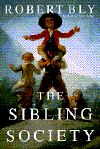A review of Robert Bly’s The Sibling Society

Book review by Rolf Potts
Throughout history, we humans have always found egoistic preoccupation in the notion that the world is about to end. Unfortunately, human society sometimes lacks the proper locust plagues and evil empires necessary to fuel our doomsday obsessions. This is when the end of the world as we know it becomes the destiny of the young.
In recent years, America’s social critics have taken to fondling “Generation X” media trends like Delphic sheep-guts — and no shred of cultural minutia can escape the Oracle of Hysteria. A drop in college test scores suggests the Beginning of the End of Competitiveness. A movie about twentysomething anomie marks the Beginning of the End of Leadership. The latest drive-by shooting foreshadows the end of civilization. Syndicated newspaper columns begin to sound like the Book of Revelations.
Robert Bly’s recent book, The Sibling Society, is the latest doom-oracle for those of us born after the advent of polyester clothing. Bly’s premise is that America has turned away from the inherited traditions of patriarchal culture — that we now live and learn within a non-hierarchical, information-sodden “sibling” society. On the surface, this does not seem particularly pessimistic, but Bly doesn’t waste his time looking for positives within his thesis. “How did we move,” Bly asks, “from the optimistic, companionable, food-passing youngsters gathered on that field at Woodstock to the self-doubting, dark-hearted, turned-in, death-praising, indifferent, wised-up, deconstructionist audience that now attends a grunge concert?”
Bly never answers his question directly. Instead, he illustrates his ideas with Freudian psychology, folk stories, poetry and statistics. This approach is an innovative way to support an argument, but we mostly end up dancing around issues while Bly shows us how wise and sensitive he is. The only time he directly addresses his Woodstock-to-grunge question is when he interprets recent trends in technology, music and movies. The problem with this, of course, is that cobbling together pop culture to analyze the condition of humanity is an absurdity akin to visiting the shopping mall at Christmas-time to grill Santa Claus for answers about the birth of Christ.
Is society on the decline because gangsta raps aren’t as affectionate as Beatles lyrics were? Is human passion nearly extinct because Kevin Costner doesn’t compare with Clark Gable as a romantic movie lead? Is manhood being devastated because Homer Simpson provides a poor example of masculinity? Do these questions sound ridiculous?
The notion of losing the world to the young has always been confused with the idea of losing the world entirely. From Nestor’s lecture to Achilles in The Iliad to Newt Gingrich’s sentimental political hand-wringing, the Apex of Mankind has been holding steady at roughly 40 years ago for the last three millenniums. Conveniently, a given society is never as good as it was during the time when a given doomsayer came of age, and everything since has been a slippery slide on the downward spiral.
Apparently, the handwringers do not consider the possibility that we are merely facing new manifestations of the same old problems that have beset the human race since we decided to give up goat herding and build cities. And amidst all the commentary bemoaning Generation X angst and apathy, no one ever states the obvious: that angst and apathy are characteristics of youth, and youth is not a permanent condition.
In spite of all the furrowed brows, those of us in today’s younger generation will go on to make fine teachers, accountants and community leaders. There’s even a good chance that we, too, will confuse youth with sentimentality and brazenly declare our own End of the World. My guess is that the harbingers of that apocalypse are sitting in baby carriages at this very moment.

Category: Travel Writing